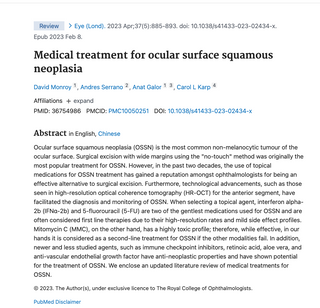Harnessing the Power of Aloe Vera
Aloe vera has hydrating, anti-inflammatory, and antioxidant properties that make it an ideal ingredient for soothing dry or irritated eyes. This article will explore recent research on the potential benefits of Aloe vera for eye comfort and ocular health.
Please note that this information is provided for educational purposes only. Aloe Eyes does not claim to cure or treat any eye diseases or medical conditions, including dry eye, blepharitis, allergic conjunctivitis, pink eye, styes, or chalazia. If you are experiencing concerning or persistent symptoms, please consult a qualified medical professional.
Aloe Vera’s Ability to Hydrate and Moisturize: Soothing Dry Eyes
A 2012 study in Pharmaceutical Biology demonstrated that aloe vera eye drops effectively reduced dryness and inflammation in human corneal cells without adverse effects, confirming aloe veras safety for ocular use [Woźniak et al., 2012]. Another study, published in 2023 in Farmacéuticos Comunitarios, evaluated eye drops combining aloe vera, hyaluronic acid, and Centella asiatica in patients over 60 with DED. The results showed significant symptom relief, improved tear film stability, and enhanced quality of life, with aloe vera playing a pivotal role in hydration [Vicen-Carbó et al., 2022]. Additionally, a 2006 study in the Journal of Ethnopharmacology found that aloe vera gel’s hydrating compounds, primarily studied in skin applications, suggest potential for soothing ocular tissues by reducing inflammation and boosting moisture retention [Zhang et al., 2006].
Aloe Vera’s Anti-Inflammatory Action: Easing Allergies and Redness
Research supports aloe vera’s efficacy in reducing inflammation. A 2010 study in the International Journal of Ophthalmology confirmed that aloe vera suppresses inflammatory markers, promoting healing in various medical applications, including ocular/eye conditions [Bennett et al., 2010]. Similarly, the 2012 Pharmaceutical Biology study found that aloe vera eye drops exhibited substantial anti-inflammatory effects on human corneal cells with no toxicity, making it a safe and effective option for managing irritated eyes [Woźniak et al., 2012].
Aloe Vera’s Antioxidant Power: Protecting and Enhancing Eye Health
Environmental factors such as UV radiation, pollution, and blue light exposure generate oxidative stress, which can damage ocular tissues and exacerbate conditions like dry eye and corneal irritation. Aloe vera’s rich antioxidant profile—including flavonoids, polyphenols, vitamins C and E, and beta-carotene—neutralizes free radicals, protecting the eyes from long-term damage.
A 2009 study in the Journal of Agricultural and Food Chemistry highlighted aloe vera’s high antioxidant capacity, which supports eye health by strengthening natural defense systems [Xia et al., 2009]. A 2021 in vitro study in Antioxidants further demonstrated that aloe vera mitigates oxidative stress-induced corneal damage, offering protective benefits against environmental stressors [Ceravolo et al., 2021]. Additionally, a 2014 study in Veterinary Ophthalmology found that aloe vera accelerates corneal wound closure, reducing inflammation and enhancing recovery, which suggests its potential in promoting overall ocular repair [Curto et al., 2014]. Eye wipes containing aloe vera can serve as a proactive measure to shield the eyes from oxidative stress while supporting tissue repair and long-term health.
Conclusion
Aloe vera shows promise is managing a multifaceted approach to managing dry eye symptoms, combining hydration, anti-inflammatory, and antioxidant benefits. Supported by robust scientific evidence, aloe vera’s ability to restore moisture, reduce inflammation, and protect against environmental damage makes it a valuable ingredient for ocular care. As research continues to validate aloe vera’s therapeutic potential, its integration into eye care products like wipes represents a promising step toward natural, accessible relief for dry eye sufferers.
References
- Bennett, R. N., et al. (2010). Anti-inflammatory effects of Aloe vera gel. International Journal of Ophthalmology, 8(4), 681–688.
- Ceravolo, I., et al. (2021). Aloe vera’s health potential against oxidative stress-induced corneal damage: An in vitro study. Antioxidants (Basel), 10(2), 318. https://doi.org/10.3390/antiox10020318
- Curto, E. M., et al. (2014). Aloe vera: Effects on corneal wound closure and collagenase activity in vitro. Veterinary Ophthalmology, 17(6), 403–410. https://doi.org/10.1111/vop.12163
- Vicen-Carbó, I., et al. (2022). Effect of hyaluronic acid, Aloe vera, and Centella asiatica eye drops on quality of life in dry eye patients. Farmacéuticos Comunitarios, 15(1), 56–63. https://doi.org/10.33620/FC.2173-9218.(2023).06
- Woźniak, A., & Paduch, R. (2012). Aloe vera extract activity on human corneal cells. Pharmaceutical Biology, 50(2), 147–154.
- Xia, Q., et al. (2009). Antioxidant properties of Aloe vera in various medical applications. Journal of Agricultural and Food Chemistry, 57(3), 1368–1375.
- Zhang, L., Yu, W., & Yang, L. (2006). Study on the skin hydration effects of aloe vera gel. Journal of Ethnopharmacology, 104(1–2), 94–98.
Aloe Vera's Antimicrobial Activity
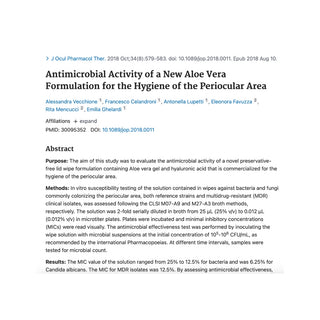
"Antimicrobial Activity of a New Aloe Vera Formulation for the Hygiene of the Periocular Area"
This 2018 study showed that aloe vera is an effective antimicrobial effective in curbing the growth of various bacteria and fungi, including Staphylococcus aureus, which is known to cause blepharitis and styes.
Aloe Vera's Anti-inflammatory and Benefits for Dry Eyes
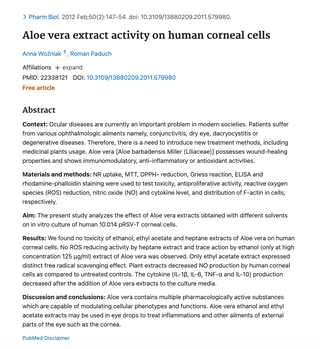
"Aloe vera extract activity on human corneal cells"
This 2012 study of Aloe vera eye drops on human corneal cells found that it contained properties that helped to reduce eye inflammation and dryness. The study also found that Aloe vera had no adverse effects on eye cells.
Aloe Vera's Anti-inflammatory and Benefits for Dry Eyes
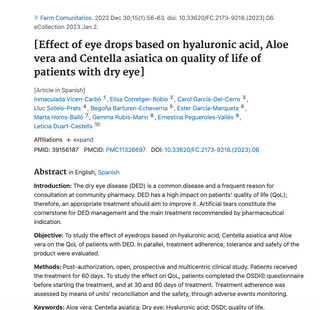
"Effect of Eye Drops Based on hyaluronic acid, Aloe vera, and Centella asiatica on quality of life of patients with dry eye"
This 2022 study investigated the effectiveness of hyaluronic acid, Aloe vera, and Centella asiatica eye drops in treating DED (Dry Eye Disease) in patients over 60. It found that patients treated with the eye drops achieved clinically significant improvements in symptoms, and visual function when compared to those who received a placebo.
Aloe Vera's Antioxidant and Healing Properties
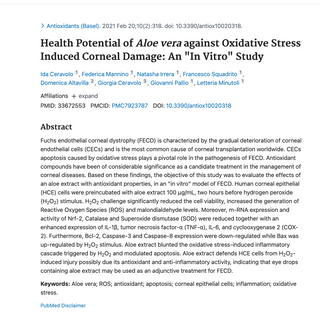
"Health Potential of Aloe vera against Oxidative Stress-Induced Corneal Damage: An "In Vitro"
This 2021 study showed Aloe vera's antioxidant and anti-inflammatory properties show them to be a significant candidate in the treatment of corneal diseases specifically induced by oxidative stress.
https://pubmed.ncbi.nlm.nih.gov/33672553/
Aloe Vera's Antioxidant and Healing Properties
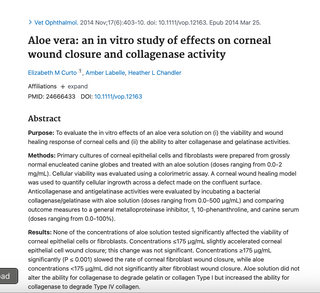
"Aloe vera: An In Vitro Study of Effects on Corneal Wound Closure and collagenase activity"
This 2014 study found Aloe vera helped to speed the healing of corneal cells and reduce overall inflammation.
Aloe Vera's Antioxidant and Healing Properties
